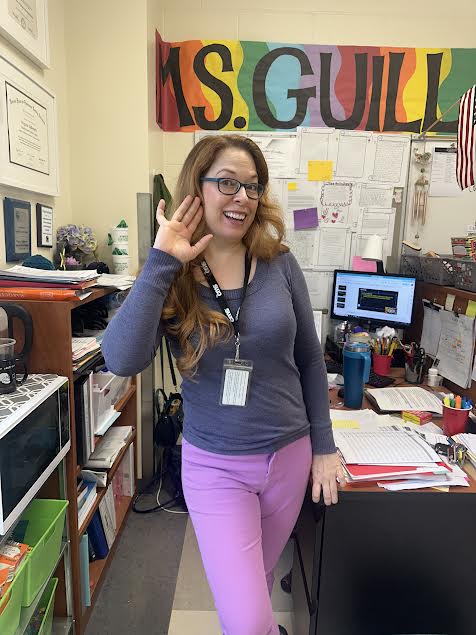
Photo contributed by Emma Dowdeswell
AP Seminar is a foundational course that aims to equip students with the power to analyze, and evaluate information with accuracy and precision to craft to communicate
evidence-based arguments. This class aims to teach cooperation, group work, communication, and deadlines through hands-on hands-on. It’s not your regular AP class, it requires both students and teachers to open their minds and explore similarities and differences within groups. I asked current AP Seminar teacher, Ms. Guillemette, the following questions to get a better understanding of the class.
-What made you decide to be the next AP seminar teacher?
I was approached by Mrs. Armstrong, who asked me if I was interested in teaching the course when the previous teacher was leaving Myers Park. I thought it would be a fun course to teach, and would also be a great challenge for me.
– What’s one thing you’ve noticed students improve on in the seminars?
One thing I think that students have improved on the most is developing arguments and supporting them with evidence. Parallel to that is also a big improvement in being able to analyze and evaluate other people’s arguments and to really think critically about the ideas they are presented with. Being able to question and objectively engage with arguments is a really important skill to have as you go into the real world, because you will be confronted with lots of information, opinions, and rhetoric, and being able to sift through that and really identify what is relevant and credible is so important for deciding what to believe.
– What differences do you notice when teaching English 2 and Seminar? Any similarities?
The biggest difference I see is that in English II, the emphasis is on developing writing style and structure. In AP Seminar, writing is less about having an engaging style, but in developing clear and sound arguments. There is also an expectation in AP Seminar to conduct research at a very high level of academic scholarship, and to really synthesize information from a variety of sources as opposed to focusing on individual pieces of literature.
– What’s one thing AP students need to work on?
I think the biggest skill that AP Students need to work on is flexible thinking, going beyond superficial understandings, and being able to see the connective threads between ideas and subjects. AP Seminar is not a course that requires you to regurgitate factual information, but is really designed to develop students’ ability to think critically, to develop original ideas, and to articulate the connections between ideas. This is very different from the skills they might be practicing in other AP classes that just require them to know a set of information. I think engaging more with different points of view, learning about different varying topics, and overall being a curious and creative person are qualities that really help students in AP Seminar.
-What one thing would you change about the AP seminar?
One thing I am a bit critical of in AP Seminar are the rubrics, which I feel are not always concrete or clear about what the goals of the task are. It takes a lot of unpacking together with students to really get to the heart of what AP Seminar is asking for and what that actually looks like. If students don’t have a teacher who is able to clearly articulate what the concrete goals are for skills and knowledge, they might not be as successful, which is a weakness in the course, I believe.
Through Ms. Guillmettes perspective, we can see that AP seminar has intricate and complex material that students don’t usually get to learn in a regular English and humanities class. Many of the AP classes teach to a test, but AP seminar equips students with the ability to work with others and build the foundation for successful leadership and communication skills.
